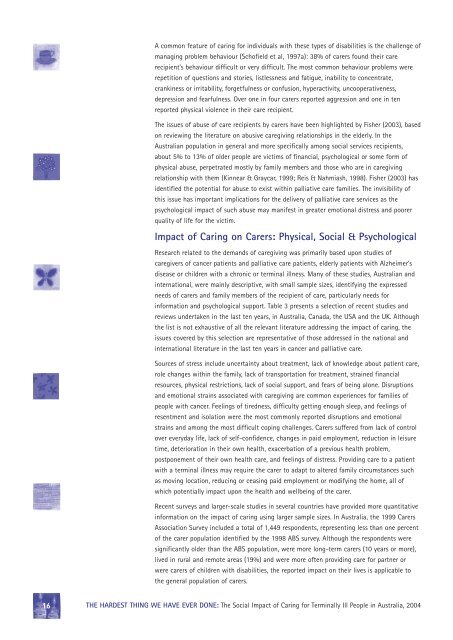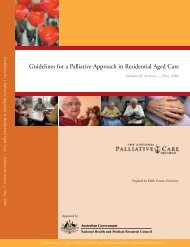The hardest thing we have ever done - Palliative Care Australia
The hardest thing we have ever done - Palliative Care Australia
The hardest thing we have ever done - Palliative Care Australia
Create successful ePaper yourself
Turn your PDF publications into a flip-book with our unique Google optimized e-Paper software.
A common feature of caring for individuals with these types of disabilities is the challenge of<br />
managing problem behaviour (Schofield et al, 1997a): 38% of carers found their care<br />
recipient’s behaviour difficult or very difficult. <strong>The</strong> most common behaviour problems <strong>we</strong>re<br />
repetition of questions and stories, listlessness and fatigue, inability to concentrate,<br />
crankiness or irritability, forgetfulness or confusion, hyperactivity, uncooperativeness,<br />
depression and fearfulness. Over one in four carers reported aggression and one in ten<br />
reported physical violence in their care recipient.<br />
<strong>The</strong> issues of abuse of care recipients by carers <strong>have</strong> been highlighted by Fisher (2003), based<br />
on reviewing the literature on abusive caregiving relationships in the elderly. In the<br />
<strong>Australia</strong>n population in general and more specifically among social services recipients,<br />
about 5% to 13% of older people are victims of financial, psychological or some form of<br />
physical abuse, perpetrated mostly by family members and those who are in caregiving<br />
relationship with them (Kinnear & Graycar, 1999; Reis & Nahmiash, 1998). Fisher (2003) has<br />
identified the potential for abuse to exist within palliative care families. <strong>The</strong> invisibility of<br />
this issue has important implications for the delivery of palliative care services as the<br />
psychological impact of such abuse may manifest in greater emotional distress and poorer<br />
quality of life for the victim.<br />
Impact of Caring on <strong>Care</strong>rs: Physical, Social & Psychological<br />
Research related to the demands of caregiving was primarily based upon studies of<br />
caregivers of cancer patients and palliative care patients, elderly patients with Alzheimer’s<br />
disease or children with a chronic or terminal illness. Many of these studies, <strong>Australia</strong>n and<br />
international, <strong>we</strong>re mainly descriptive, with small sample sizes, identifying the expressed<br />
needs of carers and family members of the recipient of care, particularly needs for<br />
information and psychological support. Table 3 presents a selection of recent studies and<br />
reviews undertaken in the last ten years, in <strong>Australia</strong>, Canada, the USA and the UK. Although<br />
the list is not exhaustive of all the relevant literature addressing the impact of caring, the<br />
issues covered by this selection are representative of those addressed in the national and<br />
international literature in the last ten years in cancer and palliative care.<br />
Sources of stress include uncertainty about treatment, lack of knowledge about patient care,<br />
role changes within the family, lack of transportation for treatment, strained financial<br />
resources, physical restrictions, lack of social support, and fears of being alone. Disruptions<br />
and emotional strains associated with caregiving are common experiences for families of<br />
people with cancer. Feelings of tiredness, difficulty getting enough sleep, and feelings of<br />
resentment and isolation <strong>we</strong>re the most commonly reported disruptions and emotional<br />
strains and among the most difficult coping challenges. <strong>Care</strong>rs suffered from lack of control<br />
over <strong>ever</strong>yday life, lack of self-confidence, changes in paid employment, reduction in leisure<br />
time, deterioration in their own health, exacerbation of a previous health problem,<br />
postponement of their own health care, and feelings of distress. Providing care to a patient<br />
with a terminal illness may require the carer to adapt to altered family circumstances such<br />
as moving location, reducing or ceasing paid employment or modifying the home, all of<br />
which potentially impact upon the health and <strong>we</strong>llbeing of the carer.<br />
Recent surveys and larger-scale studies in s<strong>ever</strong>al countries <strong>have</strong> provided more quantitative<br />
information on the impact of caring using larger sample sizes. In <strong>Australia</strong>, the 1999 <strong>Care</strong>rs<br />
Association Survey included a total of 1,449 respondents, representing less than one percent<br />
of the carer population identified by the 1998 ABS survey. Although the respondents <strong>we</strong>re<br />
significantly older than the ABS population, <strong>we</strong>re more long-term carers (10 years or more),<br />
lived in rural and remote areas (19%) and <strong>we</strong>re more often providing care for partner or<br />
<strong>we</strong>re carers of children with disabilities, the reported impact on their lives is applicable to<br />
the general population of carers.<br />
16 THE HARDEST THING WE HAVE EVER DONE: <strong>The</strong> Social Impact of Caring for Terminally Ill People in <strong>Australia</strong>, 2004
















